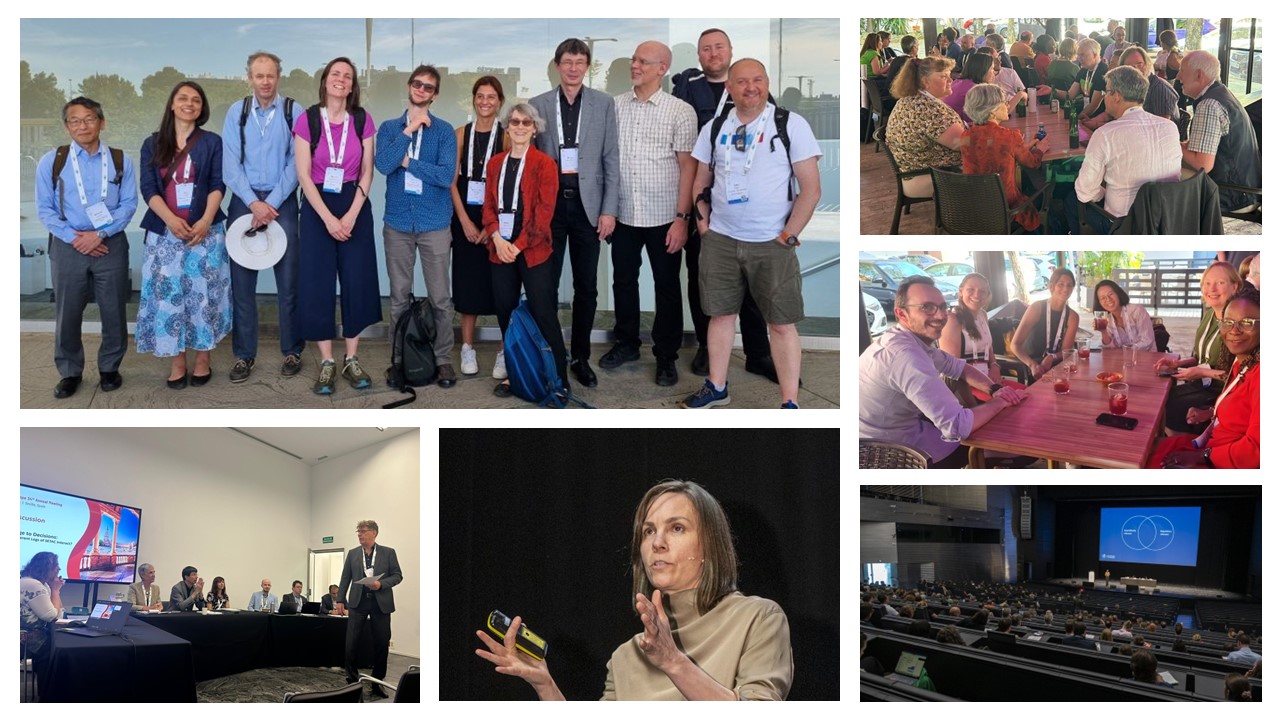
IPCP Board Members at the Open-Ended Working Group (OEWG-3)
Over 550 government delegates from 124 member states arrived at the OEWG-3 meeting in Geneva on Monday June 17, 2024 with cautious optimism for agreeing to terms of the structure and function of a new science-policy panel (SPP) on chemicals, waste and pollution prevention. Delegates left the meeting Friday June 21, 2024 at 10:50 pm, mostly with relief that the meeting was over and that the vision of the SPP was still alive. What happened in the intervening time was a display of geopolitical tensions that are being played out today in major conflicts around the globe. Part of those tensions and delay tactics came from some governments working to protect the prosperity of key economic sectors in their countries that are linked to chemicals production and use. Those tactics were in sharp contrast to urgent calls for action to stop harms to vulnerable people in low-income and vulnerable small island states beset by rising levels of pollution and waste. As expressed by some low-income country delegates, people were literally dying as delegates squabbled over details of the wording of the SPP’s foundational document. In the end, and indeed it was at 10:50 pm on Friday night that the demise of the SPP was averted. A compromise deal was brokered by the Chair of the OEWG, Her Excellency Ms. Gudi Alkemade, in which all countries agreed to deliberate two conference room papers with draft wording during a resumed session of OEWG-3 or OEWG-3.2. That meeting will take place immediately before the high-level government meeting that will formally establish the SPP.
The IPCP was represented by five board members who followed all sessions, spoke with delegates and made a few interventions during the meeting. Our two-page policy briefs were of interest to many delegates as the briefs provided background information and ideas to shape the SPP. The IPCP will once again represent the voice of independent scientists at the meeting of OEWG-3.2 and the first SPP meeting.
SETAC Europe
The IPCP had a big footprint at the recent 34th SETAC Europe meeting in Seville, Spain. Board member Marlene Ågerstrand delivered the Plenary to an engaged audience entitled “Science-Policy Interactions in Risk Assessment and Management of Chemicals”. Our group also had platform and poster sessions chaired by Penny Vlahos, Lena Vierke, Miriam Diamond, and Marlene Ågerstrand entitled “Science for Global Management of Chemicals”. Several presentations were delivered including:
-
- Diamond et al., T-01 “Why we need science free of Conflict of Interest for Global Management of Chemicals”
-
- Lohmann et al., P-Mo532 “The International Panel on Chemical Pollution (IPCP): Academic scientists’ voice in support of the Intergovernmental Science−Policy Panel on Chemicals and Waste”
-
- Carney-Almroth et al., P-Mo533 “Obstacles to Scientific Input in Global Policy”
-
- Vlahos, et al., P-Mo531 “Recommendations for the Deliverables of the new Science and Policy Panel on Chemicals, Waste and Pollution Prevention”.
Additionally, Gunilla Öberg and Martin Scheringer contributed to a Forum Discussion: “From Knowledge to Decisions: How Should the Different Legs of SETAC Interact?”. The IPCP also hosted an informal get together for members during the week to interact and exchange ideas.
We are also pleased that our proposal for a session at the SETAC Europe 35th Annual Meeting held from 11-15 May in Vienna, Austria has been accepted. Look out for the call for abstracts and consider submitting a proposal for our proposed session: “Scientific Input to the New Global Science-Policy Panel” under Track: 6. “Environmental Policy, Risk Management, and Science Communication”. We hope to see you in Vienna!
Recent IPCP Publications
For those following the establishment of the new Science-Policy Panel on Chemicals, Waste and Pollution Prevention, there have been thoughts and ideas of what the SPP would actually do. The United Nations Environment Assembly resolution to establish the SPP includes the function of providing information to tackle pollution as one of triple planetary crisis. That information should be especially relevant to low-income countries. Some have thought that the SPP would conduct assessment of individual or classes of chemicals, something done by environment agencies in several high-income countries. Others have considered that the SPP should undertake Solutions-Oriented Assessments. Such assessment would carefully navigate the line between providing policy-relevant but not policy-prescriptive information.
In this space of uncertainty, the IPCP led the publication of a peer-reviewed paper that contemplated the role of the SPP and what its assessments might look like. The paper, published in Environmental Science and Technology Letters a few weeks before the OEWG-3 meeting held from 17-21 June, 2024 in Geneva, proposed a vision for the SPP to conduct prospective and retrospective solutions-oriented analyses. The prospective analyses would look forward with the aim of averting harmful and costly damage caused by chemicals and waste. The retrospective analyses would look at existing problems. The paper stresses that prospective analyses are important so that damage and costs can be minimized, but that retrospective analyses should strive to explore options to festering problems. The paper ends by providing one example each of a prospective analysis (climate change impacts on chemical and waste release) and a retrospective one (pollution from pharmaceuticals) that requires an interdisciplinary, “all hands on deck” approach. What is at stake, is giving the world the ambition and the process for seeking effective solutions, bolstered by evidence and strong critical analysis, that countries could adopt to minimize the harms posed by chemicals and waste.
Invitation to IPCP Working Group
We are currently collecting ideas for priority topics for future working groups under the umbrella of the IPCP. If you are interested in participating or leading a working group please write to admin[-at-]ipcp.ch. The plan is to compile suggested topics and reach out to interested members soon after that.
General Assembly 2024
The 2024 General Assembly of the IPCP will once again take place remotely. All IPCP members are welcome to attend.
DATE: Wednesday, October 2, 2024
TIME: 14-16h Central European
